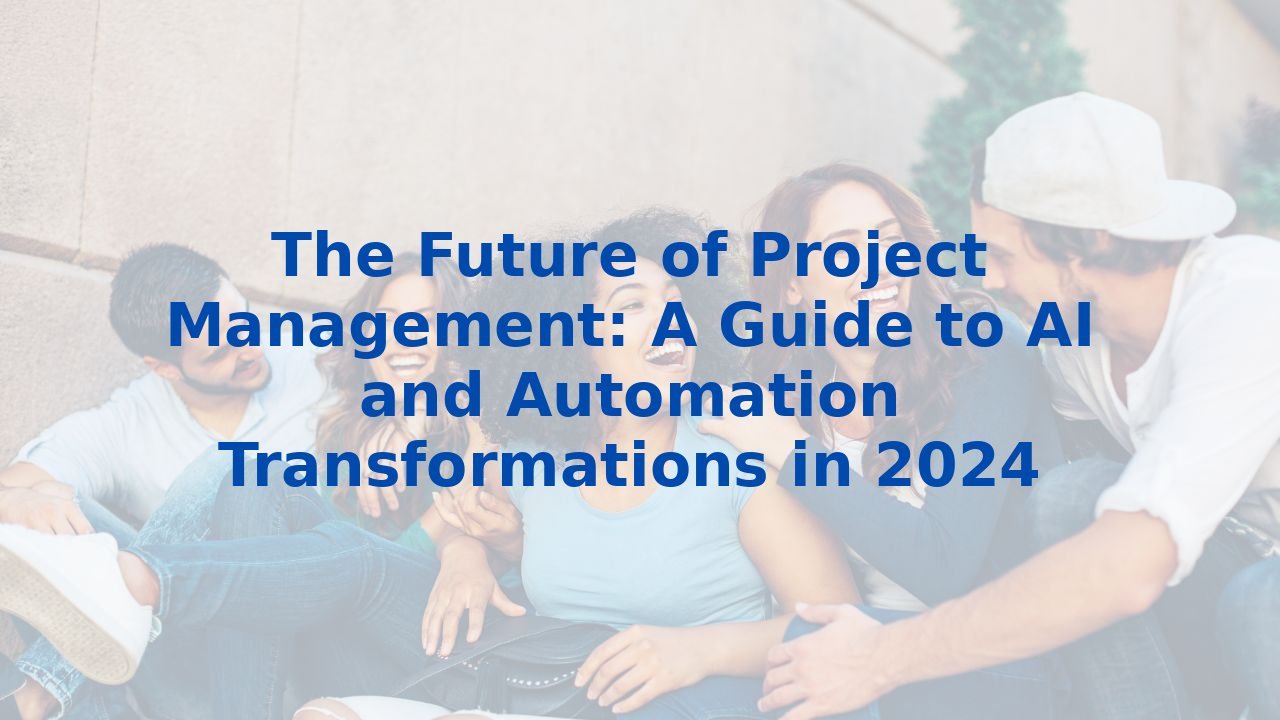The Future of Project Management: A Guide to AI and Automation Transformations in 2024
The Future of Project Management: A Guide to AI and Automation Transformations in 2024
Introduction
In the dynamic landscape of 2024, project management is experiencing a radical transformation driven by the integration of AI and automation. These technologies are not merely augmenting workflows but are fundamentally reshaping the very core of how projects are managed. As we explore this evolution, one thing becomes clear: companies that embrace the change will unlock new levels of efficiency and success.
The Impact of AI on Project Management
Task Streamlining
AI has emerged as a powerful ally in streamlining project management tasks. By automating mundane and repetitive tasks—like data entry and scheduling—project managers can redirect their focus towards strategic decision-making and leadership. Imagine a scenario where project managers spend less time bogged down by administrative tasks and more time on crafting a vision for their projects. This ability to prioritize high-value activities translates into substantial time savings and increased overall productivity.
Enhanced Decision-Making
In the fast-paced world of project management, the ability to make informed decisions quickly can be the difference between success and failure. AI’s capability to analyze vast amounts of data rapidly means that project managers can gain insights that would otherwise be overlooked. This data-driven approach reduces the risk of project delays and unforeseen costs, positioning teams to harness the full potential of their resources.
Predictive Analytics
The future of project management will leverage AI-powered predictive analytics to forecast timelines and resource needs with unprecedented accuracy. This predictive capability allows for informed resource allocation and streamlined scheduling, diminishing the chances of budget overruns or missed deadlines. The result? Projects are completed more effectively and rival expectations.
Collaboration and Communication
Effective communication is the backbone of successful project management. AI-driven tools can revolutionize team collaboration by automating communication tasks. By generating meeting summaries and follow-up emails, AI ensures that everyone remains aligned. This not only frees time for project managers but also enhances clarity among team members, fostering a culture of transparency.
The Role of Automation in Project Management
Automation of Routine Tasks
Automation provides a remarkable opportunity to minimize human error in project management. By handling repetitive tasks like project scheduling and resource allocation, organizations can improve efficiency and reliability. When operational tasks are automated, project managers are better positioned to engage in critical problem-solving and innovative thinking.
Real-Time Monitoring
One of the most significant advantages of automation is the capability for real-time monitoring of project progress. This live data helps identify issues before they escalate, allowing teams to take corrective action swiftly. With real-time insights, decision-makers can make adjustments on the fly, supporting a proactive approach to project management.
Improved Efficiency
As project managers shift their attention away from mundane tasks, they can focus more on strategic planning and team leadership. This pivot enhances overall project productivity, creating a ripple effect where teams operate with greater cohesiveness and alignment on shared goals.
The Importance of Human Touch in AI-Driven Project Management
Contextual Understanding
Despite the numerous advantages of AI, there will always be an essential role for human expertise. AI lacks the nuanced understanding that experienced project managers possess. Human intuition, creativity, and an understanding of the project's subtleties are irreplaceable when it comes to making nuanced decisions.
Creativity and Innovation
The human spark of creativity remains central to project management. While AI can generate ideas and provide data-driven insights, it is the vision and innovative capabilities of project managers that convert these ideas into practical solutions tailored to the unique needs of each project.
Ethical Considerations
As organizations integrate AI into their project processes, ethical considerations must not be overlooked. Ensuring that AI-driven decisions align with core organizational values requires human oversight, ensuring that the deployment of technology reflects the ethos of the company.
Benefits of Training Employees for AI
Maximizing AI Potential
For organizations looking to harness the full power of AI, equipping employees with the right skills is paramount. By investing in training initiatives, companies can integrate AI seamlessly into their existing workflows, enabling projects to benefit fully from its transformative potential. Consider programs that offer comprehensive training on AI tools and methodologies, ensuring every team member is prepared for the future.
Enhanced Efficiency
Training employees on AI tools not only equips them with new skills but also promotes greater project efficiency. Knowledgeable staff can leverage AI to automate tasks, analyze vast datasets, and make quick decisions, contributing directly to the success of their projects.
Continuous Learning
The rapid evolution of AI technologies calls for a commitment to ongoing learning. Organizations should establish training programs that enable employees to stay ahead of the curve, adapting to new tools and methodologies as they arise. By cultivating a culture of continuous improvement, businesses will remain competitive in a constantly changing environment.
Conclusion
The future of project management is intrinsically tied to the evolving capabilities of AI and automation. These technologies usher in a new era focused on streamlining tasks, enhancing decision-making, and improving overall efficiency. As we embrace these changes, it is essential to maintain the human touch that drives creative solutions and ethical considerations. By strategically investing in employee training and skill development, organizations can maximize the benefits of AI, paving the way for unprecedented project success in 2024 and beyond.
For more insights on harnessing AI in project management, explore comprehensive training resources designed to equip your entire workforce. Learn more here.



